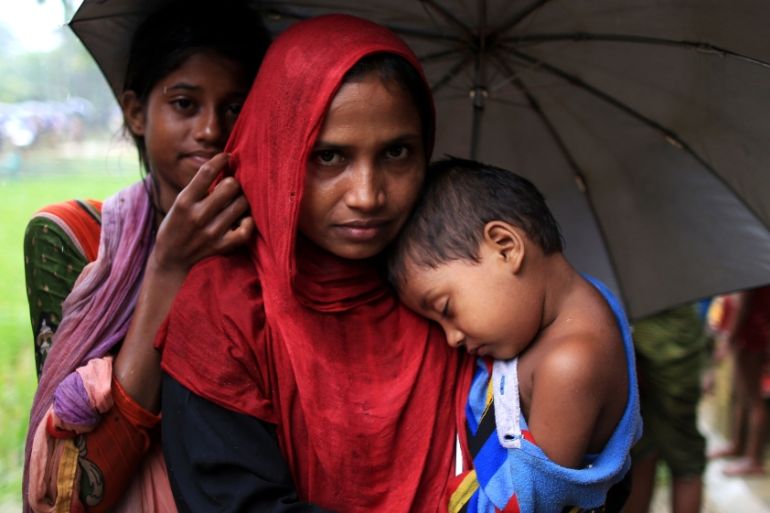Rohingya not native, Myanmar army chief says
Powerful general says the Rohingya were brought into the country by British colonialists.

Rohingya are not native to Myanmar and were brought by British colonialists, the country’s powerful army chief told the US ambassador.
Senior General Min Aung Hlaing gave his most extensive account of the Rohingya refugee crisis in the meeting with American Ambassador Scot Marciel, according to a report posted on his Facebook page on Thursday.
Keep reading
list of 4 itemsConflict, climate, corruption drive Southeast Asia people trafficking: UN
Bodies of three Rohingya found as Indonesia ends rescue for capsized boat
How is renewed violence in Myanmar affecting the Rohingya?
The general is the most powerful person in Buddhist-majority Myanmar and his apparently uncompromising stance would indicate little sensitivity over the crisis, in which more than 500,000 people have fled into neighbouring Bangladesh.
Min Aung Hlaing, referring to Rohingya by the term “Bengali”, which they regard as derogatory, said British colonialists were responsible for the problem.
“The Bengalis were not taken into the country by Myanmar but by the colonialists,” he told Marciel, according to the account of the meeting posted on Thursday.
“They are not the natives and the records prove that they were not even called Rohingya but just Bengalis during the colonial period.”
READ MORE: Army offensive aimed at ‘preventing’ Rohingya return
The UN human rights office said on Wednesday that Myanmar’s security forces had brutally driven out half a million Rohingya from northern Rakhine state to Bangladesh, torching their homes, crops and villages to prevent them from returning.
Coordinated Rohingya rebel attacks on some 30 security posts on August 25 sparked a ferocious military response.
The UN rights office said in its report, based on 65 interviews with Rohingya who had arrived in Bangladesh, that abuses had begun before the August 25 attacks and included killings, torture, and the rape of children.
The country’s civilian leader Aung San Suu Kyi is due to make a speech on television later on Thursday.
She was swept into office last year after winning an election, but the military holds immense power, including exclusive say over security.
“Local Bengalis were involved in the attacks under the leadership of ARSA. That is why they might have fled as they feel insecure,” Min Aung Hlaing said, referring to the Arakan Rohingya Salvation Army fighters.
Min Aung Hlaing, whom rights groups say carries personal responsibility for the crisis, insisted the Rohingya are merely returning to their motherland.
“The native place of Bengalis is really Bengal,” he said. “They might have fled to the other country with the same language, race and culture as theirs, assuming they would be safer there.”
FEATURE: The mental health toll of the Rohingya crisis
He said it was an exaggeration to say the number fleeing to Bangladesh was “very large”, adding that there had been “instigation and propaganda by using the media from behind the scenes”.
While immigration increased under British rule, historians say Muslim communities were recorded as living in the Rakhine region long before the colonial era.
This week, an AFP reporter on a rare government-steered trip to the conflict-hit Rakhine heard testimony from Rohingya villagers who are scared and fast running out of food.
They said Buddhist villagers are trying to starve them out of their homes.
|
|